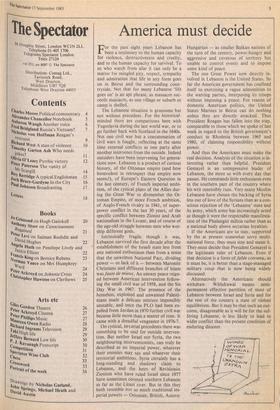America must decide
Vor the Past eight years Lebanon has been a testimony to the human capacity for violence, destructiveness and cruelty, and to the human capacity for survival. To us who watch from afar it can only be a matter for mingled pity, respect, sympathy and admiration that life in any form goes on in Beirut and the surrounding coun- tryside. Not that for many Lebanese 'life goes on' is an apt phrase, as massacre suc- ceeds massacre, as one village or suburb or camp is shelled.
The Lebanese situation is gruesome but not without precedent. For the historical- minded there are comparisons here with Yugoslavia during the last world war, or to go further back with Scotland in the 1640s. Not one civil war but a concatenation of Civil wars is fought, reflecting at the same time external conflicts as one party after another intervenes from the outside. Indeed outsiders have been intervening for genera- tions now. Lebanon is a product of curious history, of the Ottoman empire (and how benevolent in retrospect that empire now seemsl), of Europe's Eastern Question in the last century, of French imperial ambi- tion, of the cynical plans of the Allies dur- ing the Great War to dismember the Ot- toman Empire, of more French ambition, of Anglo-French rivalry in 1941, of super- power conflict in the last 30 years, of the specific conflict between Zionist and Arab nationalism in the Levant, and of course of the age-old struggle between men who wor- ship different gods.
Intrinsically fragile though it was, Lebanon survived the first decade after the establishment of the Israeli state less from any national enthusiasm than from a sense that the unwritten National Pact, dividing power — or lack of it — between Maronite Christians and different branches of Islam was faute de mieux, An uneasy peace reign- ed between American intervention follow- ing the small civil war of 1958, and the Six Day War in 1967. The presence of the homeless, exploited and unwanted Palesti- nians made a delicate mixture impossibly unstable, and once the PLO had been ex- pelled from Jordan in 1970 further civil war became little more than a matter of time. It came with a dreadful vengeance in 1976-7.
On cynical, irnt.,erial precedents there was something to be said for outside interven- tion. But neither Israel nor Syria, the two neighbouring interventionists, can truly be described as an imperial power, whatever their enemies may say and whatever their territorial ambitions. Syria certainly has a , long-standing and shadowy claim to Lebanon, and the heirs of Revisionist Zionism who have ruled Israel since 1977 have sometimes coveted southern Lebanon as far as the Litani river. But in this they both resemble not so much traditional im- perial powers — Ottoman, British, Austro- Hungarian — as smaller Balkan nations of the turn of the century, power-hungry and aggressive and covetous of territory but unable to control events and to impose some kind of peace.
The one Great Power now directly in- volved in Lebanon is the United States. So far the American government has confined itself to, exercising a vague admonition to the warring parties, interposing its troops without imposing a peace. For reason of domestic American politics, the United States Marines in Beirut can do nothing unless they are directly attacked. Thus President Reagan has fallen into the trap, comparable to those which we spoke of last week in regard to the British government's conduct in Rhodesia between 1965 and 1980, of claiming responsibility without power.
And thus the Americans must make the real decision. Analysis of the situation is in- teresting rather than helpful. President Gemayel is an unimpressive leader of Lebanon, the more so with every day that passes. He commands little enthusiasm even in the southern part of the country where his writ ostensibly runs. Very many Muslim Lebanese have chosen the backing of Syria less out of love of the Syrians than as a con- scious rejection of the 'Lebanese' state and its army, which army has increasingly acted as though it were the respectable manifesta- tion of the Phalangist militia rather than as a national body above sectarian loyalties.
If the Americans are to stay, supported by the at present somewhat sorry multi- national force, they must stay and mean it. They must decide that President Gemayel is the legitimate ruler of Lebanon. Even if that decision is a form of fable con venu, as it must be, it is better than a stage-managed military coup that is now being widely discussed.
Alternatively the Americans should withdraw. Withdrawal means semi- permanent effective partition of most of Lebanon between Israel and Syria and for the rest of the country a state of violent equilibrium. But it may be that such an out- come, disagreeable as it will be for the suf- fering Lebanese, is less likely to lead to wider conflict than the present condition of enduring disaster.






































 Previous page
Previous page